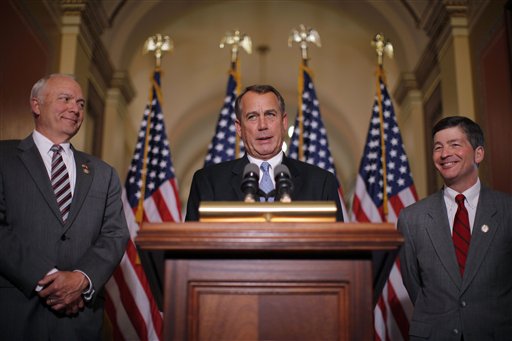(AP) Political battle over student loans heating up
By ALAN FRAM
Associated Press
WASHINGTON
Democrats and Republicans alike say they want to prevent the cost of federal loans from ballooning for millions of students. But the effort has evolved into an election-year battle each side is using to embarrass the other and spotlight its own priorities to voters.
In the latest political chess move, Speaker John Boehner, R-Ohio, scheduled a House vote for Friday on legislation preventing the 3.4 percent interest rate on subsidized Stafford student loans from doubling as scheduled on July 1. In a bitter pill for Democrats, the measure’s $5.9 billion cost would be paid for with cuts from President Barack Obama’s health care overhaul bill.
Boehner announced the vote in an abruptly called news conference Wednesday that followed days of pounding by Obama and congressional Democrats. It also came two days after the GOP’s presumptive presidential candidate, Mitt Romney, tried defusing the issue by embracing the call for freezing interest rates, putting more pressure on congressional Republicans to back the effort or look isolated.
Congressional GOP aides said Republicans were working on the legislation for some time and unveiled their bill to try to prevent Obama from escalating the dispute. The aides spoke on condition of anonymity to discuss party strategy.
Hours before Boehner spoke, Obama wrapped up a two-day trip to three college campuses in which he cast himself as the students’ champion and Republicans as the ones standing in the way of resolving the problem.
The backdrop to the student loan fight is a push by both parties to appeal to younger voters, an Obama strength in his 2008 election win, and to signal their sensitivity to families’ struggles during the economy’s prolonged slump. Letting the loan rate double this summer would cost 7.4 million Stafford loan recipients an average $1,000, according to the administration.
At the same time, each side wants to force the other to take politically uncomfortable votes.
The House GOP bill is paid by cutting health care programs Democrats treasure. The Senate Democratic version would force high-earning owners of some privately owned corporations to pay more Social Security and Medicare payroll taxes, violating Republicans’ anti-tax doctrine.
The House GOP bill would cut a $17 billion prevention and public health fund Obama’s law created for immunization campaigns, research, screenings and wellness education. Republicans have dubbed it a “slush fund” and sought to cut it to finance a variety of projects, succeeding earlier this year to help pay for maintaining doctors’ Medicare reimbursements.
It didn’t take long for the measure to stir up opposition among Democrats.
Rep. George Miller of California, top Democrat on the House Education Committee, accused Republicans of trying to keep student interest rates low by “extracting the price from women and children.”
House Minority Leader Nancy Pelosi, D-Calif., a supporter of the health fund Republicans targeted, said the GOP had made “a dramatic reversal” because Republicans had recently pushed a federal budget through the House that would have let student interest rates double. But her statement stopped short of saying she would oppose the GOP bill on Friday.
Senate Majority Leader Harry Reid, D-Nev., said Democrats opposed cutting the health program “just so Republicans can continue protecting millionaire tax dodgers.”
That reference was to his own legislation, which would pay for keeping student loan interest rates level for a year by forcing high-income owners of some privately held corporations to pay more Social Security and Medicare payroll taxes.
Senate Republicans say they support freezing students’ interest rates but have strongly opposed boosting those companies’ payroll taxes.
___
Associated Press writer Ricardo Alonso-Zaldivar contributed to this report.

COMMENTS
Please let us know if you're having issues with commenting.